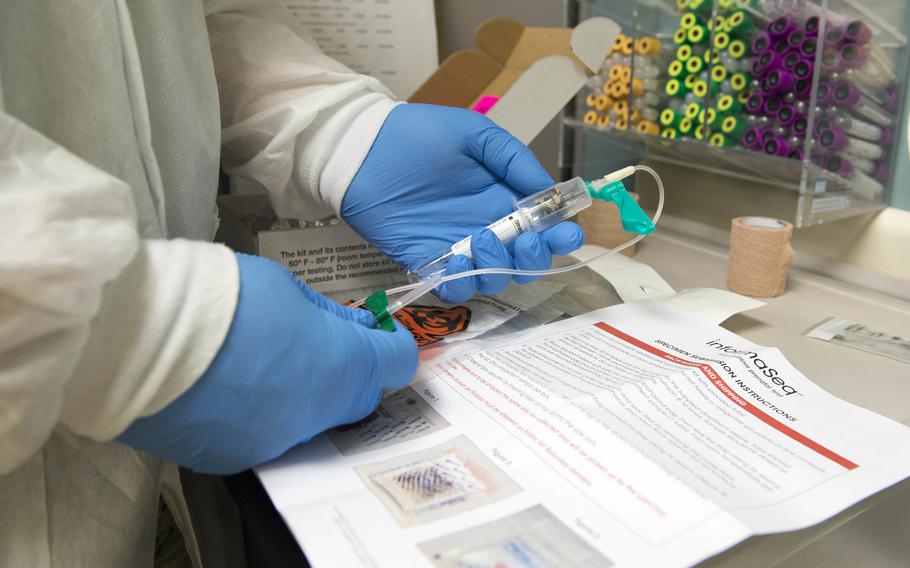Opinion
A world without Roe puts women in the military at risk
Special to Stars and Stripes June 27, 2022

An airman prepares a prenatal testing kit at Joint Base Elmendorf-Richardson, Alaska, Nov. 7, 2017. (Crystal A. Jenkins/U.S. Air Force)
“Support Our Troops!”
It’s a statement we hear often — one of patriotism and pride — to salute and encourage our military as they serve this great nation. But beyond a well-intentioned declaration, “support our troops” invokes an action. It means aiding our service members’ ability to live a quality life during and after service.
Ensuring access to health care, whether it be from injuries or illnesses sustained overseas or at home, is a huge part of “supporting our troops.” For 14.4% of our active-duty military and about 18% of our reserve and National Guard, this should include access to safe abortion services.
Make no mistake, the Supreme Court’s decision to overturn Roe v. Wade is a major threat to generations of current and future female service members.
Why? In 2018, the Defense Department reported that roughly 20,500 service members experienced sexual assault. Female service members — particularly younger, lower-ranking members who account for half of active-duty enlisted female personnel — are the very same women who are most likely to be assaulted. If getting raped by a battle buddy isn’t bad enough, these attacks sometimes also result in unwanted pregnancies. These women deserve access to a safe abortion.
What these young women, many of whom are in their early 20s, face after they are attacked can also be brutal. Carrying the emotional trauma of the assault itself, facing threats from the attacker and potential discharge as retaliation for reporting the attack and costing them their livelihood, are just a few. These scenarios are enough for female service members to not only keep their assault to themselves, but with Roe now overturned, they might also consider unsafe abortions that could be detrimental to their life. And especially so if they are stationed on a base in a state that has severe restrictions on abortion.
According to Axios, the restrictions that will come with Roe being struck down means that almost 30% of people will be more than 200 miles away from an abortion provider.
Not only will women service members needing an abortion be burdened by the distance needed to travel to get one, that same service member doesn’t get a choice where she’s stationed. So, women not wanting to find themselves in this circumstance cannot just simply move from areas that are poised to ban abortion outright like Texas, Georgia, Missouri, Kentucky, Louisiana, Oklahoma and Florida, which are home to hundreds of thousands of troops on some of the nation’s largest military installations.
Add to it all that a service member needing to travel to have a safe abortion will need a leave of duty approved, and incur travel expenses, such as a hotel stay. Physical distance between a service member and quality health care also creates compounding logistical issues that can leave a service member feeling isolated and emotionally strained. And if the location and emotional factors aren’t enough of a deterrent, military members aren’t able to take leave as easily as many of their civilian counterparts. If leave is not granted, and a service member decides to travel regardless in order to receive the health care she needs, she could be prosecuted and punished under the Uniform Code of Military Justice for being absent without leave.
Can you also imagine how emotionally harrowing the public nature of working out the logistics of these next steps with a supervisor in a professional setting would be? Especially if you’ve just been sexually assaulted? The women who are willing to sacrifice their lives for us shouldn’t be asked to go through that to simply get the care they deserve. With a lack of reporting among service members who’ve experienced sexual assault already being an issue in the military — in 2018, a mere one-third of assaulted military women reported the attack — it is also almost certain that military women would not feel comfortable enough even requesting travel, leave or coordinating necessary arrangements to obtain abortion care with their supervisors.
It’s worth noting this is a national security issue. Not just because how we care for our troops always is, but if the military is unable to provide adequate health care for women it could impact the ability to attract stellar new recruits or cause those currently serving to refrain from reenlisting. We are a nation that chooses to fight with an all-volunteer force, we need great Americans from all backgrounds stepping up to ensure our national defense, but there’s already talk that the military risks a decline in women troops with the rollback of Roe v. Wade.
In order to protect the women who serve this great country, lawmakers need to be doing everything in their power to mitigate the impact of Roe being overturned on our nation’s service members. The military itself needs to be advocating for policies like the MARCH Act, which would eliminate military abortion bans and expand access to abortion for service members and their dependents.
As women and as leaders in the military, it breaks our hearts to see our female soldiers’ health and well-being treated with such little consideration. We need to “support our troops” by upholding our promise to care for our nation’s daughters, who continue to risk their lives to ensure our freedoms every single day.
Allison Jaslow, a former Army captain, and Amy McGrath, a former Marine Corps lieutenant colonel, are board members of the Iraq and Afghanistan Veterans of America.